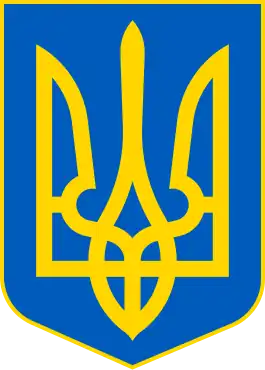| 2006 anti-NATO protests in Feodosia | |||
|---|---|---|---|
 Anti-NATO posters in Feodosia, 2006 | |||
| Date | 29 May – 4 June 2006 | ||
| Location | |||
| Caused by | Anti-NATO sentiment amongst residents of Feodosia | ||
| Goals | Cancellation of joint Ukrainian-U.S. military exercise | ||
| Methods | |||
| Resulted in | Joint military exercise being cancelled | ||
| Parties | |||
| Number | |||
| |||
Anti-NATO protests (including one riot) took place in the Ukrainian port city of Feodosia from late May to early June 2006, partially disrupting a joint Ukrainian-U.S. military exercise, which was canceled 20 July 2006.[1]
Background
The military Ukraine-NATO Partnership for Peace military exercise Sea Breeze 2006 exercise (in Crimea) was scheduled to take place in Ukraine starting 17 July 2006.[2][3] Its aim was to "simulate the defence of a peninsula caught between a totalitarian state and a democratic one."[3] "Sea Breeze" manoeuvres had been held annually since 1997.[3] Another British-Ukrainian war-game called "Tight Knot" was scheduled to start on 14 June 2006 (near Mykolaiv).[3]
Legal concerns
On 4 June 2006, Ukrainian President Viktor Yushchenko signed a decree on preparations of the two war-games. The approval for the exercises by the Verkhovna Rada (Ukraine's parliament) was still pending early June 2006 because after the parliamentary election of March 2006 it resumed its work on 7 June 2006.[4] In February 2006 the Verkhovna Rada elected before the 2006 election rejected a presidential bill on allowing foreign troops to take part in the maneuvers planned for 2006.[4] The Verkhovna Rada was due to vote on the same bill on 7 June 2006, but decided to adjourn until 14 June.[2][5]
On 6 June 2006, the Crimean legislature declared Crimea a "NATO-free territory".[3][5]
Events
On 27 May 2006, the United States (U.S.) cargo ship Advantage anchored in Feodosia, bringing what Ukrainian Defense Minister Anatoliy Hrytsenko described as U.S. "technical aid."[4] Unarmed[3] seamen offloaded construction materials to build barracks for Ukrainian sailors at a training range near the town of Stary Krym, not far from Feodosia.[4] Two days later, Feodosia residents, mobilized by local chapters of the Party of Regions, the Nataliya Vitrenko Bloc, and the Russian Community of Crimea, began to picket the port,[4] displaying anti-NATO slogans written in Russian and blocking U.S. cargo from getting to its destination.[4]
Together with Advantage, 200 U.S. Marine Corps reservists arrived to Feodosia.[2][6] Their mission was to take part in the Sea Breeze 2006 military exercise from 17 July.[2][3] When the Marine reservists tried to reach the training facility that they were assigned to renovate[6] protesters surrounded their bus, rocking it and trying to smash the windows, eventually forcing the vehicle to head to a military sanatorium, where the reservists remained.[3] Protesters reportedly harassed Marine reservists if they stepped outside their military base.[5] The marines were advised against going into nearby towns for fear of provoking noisy confrontations.[7] On 4 June 2006 U.S. marines began leaving Crimea.[7] American and Ukrainian officials stated because their contract was ending.[7] Associated Press reported that no repair work was done at the base they were assigned to renovate.[6] On June 8 Ukraine and United Kingdom postponed Tight Knot.[6] On 20 July 2006 the United States cancelled Sea Breeze, "due to the situation in the Middle East".[1]
Reportedly the group of protesters rarely consisted of more than a few hundred demonstrators.[4][7] They accused NATO and the United States of seeking a foothold in Ukraine.[7] The Ukrainian defense ministry stated 2 June 2006 that the planned exercises were not connected with NATO.
NATO-involved military events in Ukraine since 2006
The 2006 Crimean anti-NATO protests did not impact foreign military units to participate in multinational military exercises in Ukraine.[8] Various military exercises (including ones with NATO troops) were held in Crimea since 2006.[8][9]
According to a poll by Razumkov Center in March 2011 some 51% of the Crimean residents considered NATO a threat, while across Ukraine this rate was 20.6% on average.[10]
See also
References
- 1 2 U.S.-Led Naval Exercise In Black Sea Cancelled, Radio Free Europe/Radio Liberty (20 July 2006)
- 1 2 3 4 Jeremy, Page (June 8, 2006). "Anti-Nato protests threaten eastward expansion". Irish Independent.
- 1 2 3 4 5 6 7 8 Page, Jeremy (June 2006). "US troops trapped in barracks as protesters reheat Cold War 07". The Times Online. London. Retrieved April 30, 2010.
- 1 2 3 4 5 6 7 Ukraine: U.S. Navy Stopover Sparks Anti-NATO Protests, Radio Free Europe/Radio Liberty (1 June 2006)
- 1 2 3 Russia tells Ukraine to stay out of Nato, The Guardian (8 June 2006)
- 1 2 3 4 U.S. Marines Leave Ukraine, Radio Free Europe/Radio Liberty (11 June 2006)
- 1 2 3 4 5 U.S. reservists pull out of Ukraine, The New York Times (11 June 2006)
- 1 2 Crimean communists to protest against NATO's Sea Breeze exercises, Kyiv Post (May 27, 2010)
- ↑ Foreign Ministry: Sea Breeze 2011 drills no danger to Ukraine's neighbors (updated), Kyiv Post (Jun 14, 2011)
Ukraine: Clear Sailing Expected For Sea Breeze Naval Exercises, Radio Free Europe/Radio Liberty (9 July 2007)
UK-Ukraine leadership training in Crimea, Foreign and Commonwealth Office (4 April 2012) - ↑ Poll: Most Crimean residents consider Ukraine their motherland, Kyiv Post (11 April 2011)
